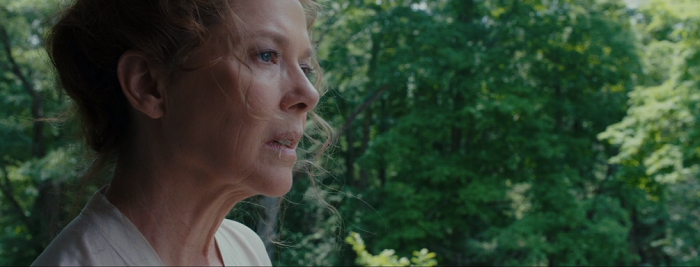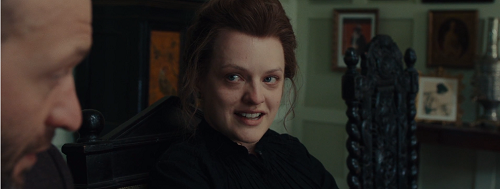

Review: The Chekhov Adaptation ‘The Seagull’ is Mad Depressing, But Is One of the Finest-Acted Films of the Year
By Roxana Hadadi | Film | May 16, 2018 |
By Roxana Hadadi | Film | May 16, 2018 |

We read some Anton Chekhov in graduate school and I remember it being depressing, but holy shit, The Seagull is so depressing. This play was written more than 100 years ago but its concerns about artistic purity and genuine creativity still feel unbelievably relevant, and director Michael Mayer and screenwriter Stephen Karam adapt Chekhov’s classic into a film that is simultaneously familiar and evocative.

The Seagull primarily follows four characters whose paths run in parallel for a little while and then jumble together, forming unwieldy relationships that eventually lead to ruin, and each part is perfectly captured by its respective actor. There’s Konstantin (Billy Howle), a young playwright struggling to find his own voice in avant-garde theatre, whose work is dismissed at every turn by his mother, popular actress Irina (Annette Bening). She primarily works in comedies while Konstantin is putting together lofty works that consider the meaning of life; he calls her performances “cheap, vulgar,” while she says during one of his plays, “I think this is supposed to be high art.” They are both pretty terrible to each other!
Despite not getting along, they both care deeply for Irina’s brother Sorin (Brian Dennehy), who is dying slowly in their lakeside familial estate. With the prospect of his passing looming, Konstantin and Irina come together and bring along their respective romantic partners: the young, gorgeous, effervescent Nina (Saoirse Ronan), who serves as Konstantin’s muse even though she admits not really knowing what his plays are about, and the successful, handsome, famous playwright Boris (Corey Stoll), who is younger than Irina but who seems simultaneously enthralled and bemused by her forceful personality.

Written for the stage, The Seagull keeps all of its characters fairly confined on the estate and the surrounding grounds, and how they treat the natural world is an extension of themselves. Irina is rarely outside at all, preferring the service she receives from the servants inside, hating to be alone with a book or her thoughts. She would rather talk about herself (“I experience life, I never think about the future, I never think about old age or death … I could play a girl of 15!”) than consider the feelings of anyone else. She’s in total opposition to her son, who retreats to the fields and the forest often, and whose first act of violence—the shooting of a seagull, which he presents at Nina’s feet—seems primarily like a personal test. And then there are Nina and Boris, who during a boat ride on the lake lay bare their overlapping feelings about fame: she craves it and he’s exhausted by it, but they fundamentally both want it, both want relevance and adoration. They’re the kind who kiss and consume.
Chekhov’s works weren’t subtle in their themes, but Mayer and Karam haven’t made The Seagull more heavy-handed than the original text. Everyone is unhappy, almost exhaustingly so, but the casting here is exquisite, and the performances are equal to the themes of class warfare, artistic defiance, and familial disappointment in Chekhov’s play. And while Ronan and Bening are both phenomenal (the former showing her range by going bubbly and hopeful in a way Lady Bird never was; the latter reminding you that she should have won a damn Oscar for 20th Century Women), it’s Elisabeth Moss who steals the whole thing with another banger of a performance.

I’ve watched dozens of hours of Moss being amazing in Mad Men, The Handmaid’s Tale, and Top of the Lake, and I was still overwhelmed by her deeply sad, wryly funny turn as Masha, a family friend who has been in love with Konstantin for years. Infatuated with Nina, he doesn’t have time for Masha, often literally yelling at her to leave him alone, and so she reacts purely and dramatically. She slips vodka in her morning tea. She dresses in head-to-toe black, explaining “I’m in mourning—for my life.” And when she toasts to herself, she starts with self-pity and ends in defiance: “To Masha, who has no clue where she belongs, or what she’s doing on this earth.” While everyone is in pain in The Seagull, you’ll sense Masha’s discontent most acutely, and Moss’s performance is unforgettable.
The Seagull ends in a shattering way but is such an engrossing watch because Chekhov’s work more than a century ago explored questions that we still consider in nearly every form of pop culture today. What is art? Is it always dramatic? Is it always weighty? Can it make us laugh? Should it only make us cry? Can creativity truly exist within old forms? How do you make new forms of theater, of poetry, of literature, of film when the old guard refuses to vacate their positions of power? We’re living during a time when people are demanding changes in institutions that have been occupied by the same individuals and gate keepers for far too long, and it’s not that difficult to draw through lines between what is finally happening now with what Chekhov was advocating for decades ago in The Seagull. Mayer and Karam have made a definitive version of the Russian playwright’s classic.
← Trailer: Keanu Reeves and Winona Ryder Reunite for 'Destination Wedding' | This Is Not a Review of Lars Von Trier's 'The House That Jack Built' →
More Like This
'The Gentlemen' Review: Ritchie's Latest Episodic Caper is a Blast for Fans of his Formula
Kristen Stewart's 'Love Lies Bleeding' Is Gonna Kick Your Ass And Make You Beg For More
What the Hell Is Going On in Apple TV+'s 'Constellation'?
‘Shōgun’ is TV’s Next Big Epic
It's Not the Filmmakers' Fault that Bill Belichick Sucks in 'The Dynasty: New England Patriots'

What’s Old Is New Again: Old Hollywood Glamour Glitters at the 2024 Oscars
Al Pacino Presents Best Picture Oscar, Confuses Everyone
The Dangerous Lie Of 'TradWives'
A Legendary Horror Franchise Is Headed To Television
'The Mandalorian' Season 4 Is Probably Not Happening
Halle Bailey On Why She Chose To Keep Her Pregnancy Private
More Like This
'The Gentlemen' Review: Ritchie's Latest Episodic Caper is a Blast for Fans of his Formula
Kristen Stewart's 'Love Lies Bleeding' Is Gonna Kick Your Ass And Make You Beg For More
What the Hell Is Going On in Apple TV+'s 'Constellation'?
‘Shōgun’ is TV’s Next Big Epic
It's Not the Filmmakers' Fault that Bill Belichick Sucks in 'The Dynasty: New England Patriots'
Reviews